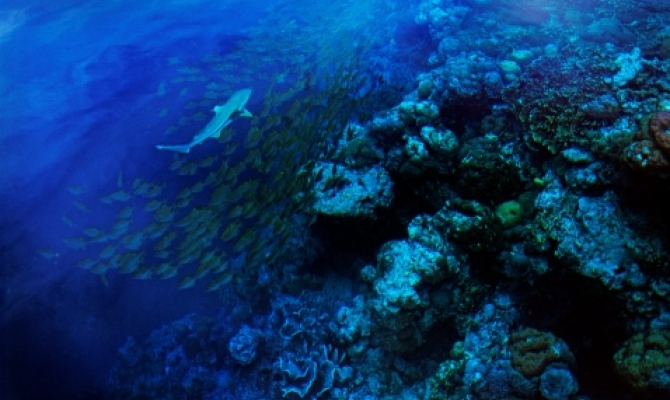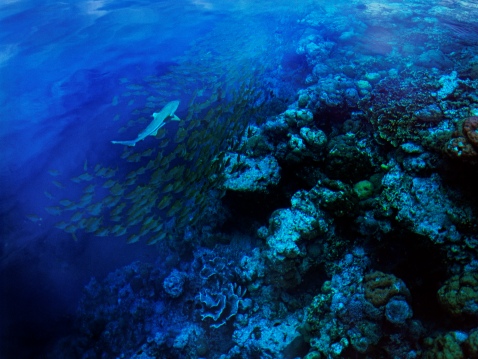
Island and Ocean Ecosystems
The United States President Barack Obama has announced that he will expand the legal protection currently in place for the Pacific Remote Islands Marine National Monument beyond the existing 12 nautical mile boundary.
"I'm using my authority as President to protect some of our most precious marine landscapes just like we do for mountains, rivers and forests," President Obama said in a taped message to the US State Department's Our Ocean conference in Washington this month.
"Growing up in Hawaii, I learned early to appreciate the beauty and power of the ocean, we also know how fragile our blue planet can be," President Obama said, pointing to threats like ocean acidification, overfishing, and pollution.
"If we ignore these problems, if we drain our oceans of their resources, we won't just be squandering one of humanity's greatest treasures, we'll be cutting off one of the world's major sources of food and economic growth."

This move is seen as a beacon of hope by the Secretariat of the Pacific Regional Environment Programme (SPREP), the intergovernmental Pacific regional organisation charged with protecting and improving the Pacific environment and ensuring sustainable development for present and future generations.
The United States of America is a long term and valued member of SPREP.
"We applaud the United States President for his great vision and leadership in this area. Our Pacific islands region covers over 10% of the total global ocean area. It is the repository of the world's largest tuna fishery and the planet's largest expanse of coral reefs. It is home to over 30,000 islands that support our Pacific communities and our ocean has provided Pacific people with rich natural resources for their survival," said Mr. David Sheppard, Director-General of SPREP.
"We have many initiatives underway to help protect our ocean but we recognise that the most important single action to stop the decline in ocean health and its associated wildlife is the establishment of a network of effectively managed Marine Protected Areas (MPAs). In this regard we congratulate the United States President for his bold move to protect the oceans of our region and the world"
President Obama is also calling on other world leaders to join him in efforts to protect our oceans, announcing that for this to succeed it must be bigger than any one country. In the Pacific there are several initiatives in place for large marine protected areas which include; the Phoenix Islands Protected Area (over 400,000 sq km) and Marine Parks of over one million sq km in both the Cook Islands and New Caledonia.
"The President's announcement is a really big statement, it's a beacon of hope for the future," said Mr. Michael Donoghue, the Threatened and Migratory Species Adviser of SPREP.
Having invested years of work into protecting marine life and the oceans, Mr. Donoghue is eager to see how SPREP can best support this latest initiative to ensure a positive flow-on effect for the Pacific islands region.
"There is no doubt that by preventing over-fishing and other destructive activities, large Marine Protected Areas provide the best available protection against stresses such as temperature rise and acidification of the ocean," said Mr. Donoghue.
"SPREP looks forward to working with the US Government and Pacific Island Governments to make the most of this inspirational initiative." - SPREP/US State Department Our Ocean Conference Coverage
"I'm using my authority as President to protect some of our most precious marine landscapes just like we do for mountains, rivers and forests," President Obama said in a taped message to the US State Department's Our Ocean conference in Washington this month.
"Growing up in Hawaii, I learned early to appreciate the beauty and power of the ocean, we also know how fragile our blue planet can be," President Obama said, pointing to threats like ocean acidification, overfishing, and pollution.
"If we ignore these problems, if we drain our oceans of their resources, we won't just be squandering one of humanity's greatest treasures, we'll be cutting off one of the world's major sources of food and economic growth."

Photo courtesy of Stuart Chape : Marovo Lagoon, Solomon Islands
This move is seen as a beacon of hope by the Secretariat of the Pacific Regional Environment Programme (SPREP), the intergovernmental Pacific regional organisation charged with protecting and improving the Pacific environment and ensuring sustainable development for present and future generations.
The United States of America is a long term and valued member of SPREP.
"We applaud the United States President for his great vision and leadership in this area. Our Pacific islands region covers over 10% of the total global ocean area. It is the repository of the world's largest tuna fishery and the planet's largest expanse of coral reefs. It is home to over 30,000 islands that support our Pacific communities and our ocean has provided Pacific people with rich natural resources for their survival," said Mr. David Sheppard, Director-General of SPREP.
"We have many initiatives underway to help protect our ocean but we recognise that the most important single action to stop the decline in ocean health and its associated wildlife is the establishment of a network of effectively managed Marine Protected Areas (MPAs). In this regard we congratulate the United States President for his bold move to protect the oceans of our region and the world"
President Obama is also calling on other world leaders to join him in efforts to protect our oceans, announcing that for this to succeed it must be bigger than any one country. In the Pacific there are several initiatives in place for large marine protected areas which include; the Phoenix Islands Protected Area (over 400,000 sq km) and Marine Parks of over one million sq km in both the Cook Islands and New Caledonia.
"The President's announcement is a really big statement, it's a beacon of hope for the future," said Mr. Michael Donoghue, the Threatened and Migratory Species Adviser of SPREP.
Having invested years of work into protecting marine life and the oceans, Mr. Donoghue is eager to see how SPREP can best support this latest initiative to ensure a positive flow-on effect for the Pacific islands region.
"There is no doubt that by preventing over-fishing and other destructive activities, large Marine Protected Areas provide the best available protection against stresses such as temperature rise and acidification of the ocean," said Mr. Donoghue.
"SPREP looks forward to working with the US Government and Pacific Island Governments to make the most of this inspirational initiative." - SPREP/US State Department Our Ocean Conference Coverage